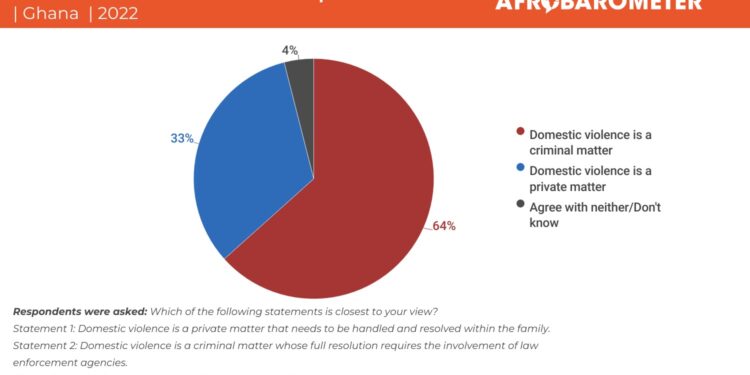Majority of Ghanaians reject physical discipline of wives, see domestic violence as a criminal matter
A recent survey conducted by Afrobarometer has revealed encouraging attitudes among Ghanaians towards gender-based violence, with a majority of respondents stating that physical discipline of wives is never justified and that domestic violence should be treated as a criminal matter, rather than a private family issue.
The survey, which was conducted across various regions of Ghana, found that 78% of respondents believed that violence against women is “not very common” or “not at all common” in their communities. This positive perception, however, was tempered by the recognition that women who report gender-based violence may be criticized or harassed, with 42% of respondents believing that this was “somewhat likely” or “very likely” to occur.
Despite this concern, the survey showed that Ghanaian citizens have faith in the ability of law enforcement to take gender-based violence seriously, with 86% of respondents believing that the police would treat cases of GBV seriously. Moreover, 64% of respondents felt that domestic violence should be treated as a criminal matter, rather than a private issue to be resolved within the family.
These attitudes are a positive sign for Ghana, which has been working to address gender-based violence through various initiatives, including the Domestic Violence Act of 2007. The Act provides a framework for the prevention and management of domestic violence, and Ghana has also established various support structures, such as the Domestic Violence and Victim Support Unit (DOVVSU) within the Ghana Police Service.
However, despite these efforts, gender-based violence remains a significant challenge in Ghana. According to the United Nations Population Fund, one in three women in Ghana has experienced some form of gender-based violence, with the COVID-19 pandemic exacerbating the problem. Reports of gender-based violence increased by 35% during the pandemic, with many women facing heightened risk due to social isolation and economic hardship.
To address these challenges, Ghana needs to continue its efforts to raise awareness about gender-based violence, strengthen support structures for survivors, and hold perpetrators accountable. This includes ensuring that women have access to safe spaces to report violence, and that they receive the necessary support and protection from authorities.
Moreover, addressing gender-based violence in Ghana will require a multifaceted approach that addresses the underlying social, economic, and cultural factors that contribute to violence against women. This includes addressing gender inequality, promoting women’s empowerment, and improving access to education and economic opportunities for women.
Overall, while the survey’s findings are encouraging, they also serve as a reminder that Ghana needs to continue its efforts to address gender-based violence and ensure that women are safe, protected, and empowered. By doing so, Ghana can build a society that values and respects the rights of all its citizens, regardless of gender.








